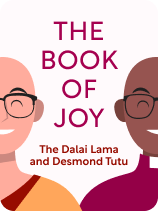

This article is an excerpt from the Shortform book guide to "The Book of Joy" by The Dalai Lama, Desmond Tutu, and Douglas Abrams. Shortform has the world's best summaries and analyses of books you should be reading.
Like this article? Sign up for a free trial here.
Do you get emotional when faced with adversity? How do you build emotional resilience?
When we’re in difficult situations, it can be hard to put on a brave face. Luckily, Desmond Tutu and the Dalai Lama’s book The Book of Joy can teach you how to control negative emotions such as anxiety, anger, and envy.
Find out how to build emotional resilience and keep a calm state of mind.
You Can Control How You Respond to Suffering
Much of our suffering is beyond our control. You might suffer because of a natural disaster, war, or an unexpected flooded basement. These are external circumstances that you can’t change. While this type of suffering is inevitable, the Dalai Lama explains that much of human suffering is avoidable because it’s caused by our emotional response to our circumstances.
The Dalai Lama advocates for cultivating equanimity (what he calls “mental immunity”), the ability to maintain a calm and positive state of mind even in the face of adversity. Cultivating equanimity will help you minimize the internal suffering caused by negative emotions like anxiety, anger, envy, sadness, and loneliness.
(Shortform note: Mindfulness is a powerful tool for cultivating equanimity. According to Bhante Gunaratana, author of Mindfulness in Plain English, mindfulness is the ability to observe your own thoughts and feelings without getting caught up in them. A regular meditation or mindfulness practice can help you minimize internal suffering by allowing you to ride the waves of your emotional ups and downs without judgment.)
Tutu and the Dalai Lama explain that fear is often the root cause of our negative emotions and therefore the cause of much of our internal suffering. We’ll outline some strategies you can use to learn how to build emotional resilience to negative emotions that stem from fear.
(Shortform note: To become more resilient to negative emotions, you must first develop your emotional intelligence, meaning greater awareness and management of your emotions. In Emotional Intelligence 2.0, Travis Bradberry and Jean Greaves argue that there are four pillars that make up emotional intelligence: self-awareness, self-management, social awareness, and relationship management. Cultivating these four pillars will help you process your emotions, manage emotional triggers, develop healthier patterns of thinking and behavior, and, ultimately, become more successful.)
Anxiety
Sometimes fear of what we can’t control leads to anxiety. Fear and anxiety are similar in that they both involve feelings of worry and unease. However, while fear is a natural emotional response to perceived danger or threat, anxiety isn’t always rooted in reality and can persist even when there’s no real danger. This constant state of anxiety leads to chronic stress which is unhealthy and can interfere with daily life.
(Shortform note: In Why Zebras Don’t Get Ulcers, neurologist Robert Sapolsky explains that chronic stress exists because humans’ stress response developed in response to short-term, physical stress factors like finding shelter or childbirth, but it hasn’t evolved to cope with the long-term sources of stress that are more typical of modern life, like meeting deadlines or planning for retirement. Our inability to cope with ongoing psychological and social stressors has led to an epidemic of chronic stress.)
When your lack of control leaves you feeling anxious, you can remember two things:
First, as Tutu and the Dalai Lama reiterate, the nature of humanity is cooperative. We live in an interdependent society in which we all need and rely on other people. Therefore, with any challenge you face, you don’t have to solve the problem alone.
(Shortform note: In fact, believing that you can solve a problem alone will likely diminish your chances of success. In Ego Is the Enemy, Ryan Holiday explains that an inflated belief in your own ability will limit your chances of succeeding. Ego, he argues, often leads to failure because it causes people to overestimate their knowledge and skills, underestimate potential threats, and dismiss the potential contributions of others.)
Second, when you experience something that you perceive as a threat, Tutu and the Dalai Lama recommend that you reframe that threat as a challenge. Reframing the perceived threat as something that your body and mind are getting ready to overcome is a form of “stress resilience” that will help you avoid the dangers of chronic stress.
(Shortform Note: In Why Zebras Don’t Get Ulcers, Sapolsky suggests other strategies to help mitigate anxiety and chronic stress, including creating predictability in your life when you can, establishing a regular exercise routine, and making sure you have a strong social support network.)
Anger
Fear of what we can’t control can also lead to frustration or anger. For example, if someone you work with is promoted ahead of you, you might respond with anger by venting to a coworker or making unfounded accusations. This anger likely stems from the fear of not getting what you need or the fear that you’re not respected or loved. Like chronic stress, anger is rarely helpful because your emotions overwhelm your ability to think logically.
(Shortform note: Many of us think of anger as a loud or violent outburst, but there are multiple types of anger. For example, passive-aggressive behavior can be a manifestation of anger, or anger can be directed inward and take the form of shame or negative self-talk.)
When you find yourself responding to fear with anger, ask yourself “What am I afraid of?” and try to address the root cause of your emotional response. You can also acknowledge responsibility by considering your own role in creating the situation that sparked your anger. It can also help to take a broader perspective, remembering that the person or people you’re in conflict with also have their own fears and values that are driving their actions.
(Shortform note: Some psychologists argue that anger is actually a useful emotion, and we shouldn’t be so quick to condemn it. For example, anger can signal a possible threat or the presence of injustice. While psychologists don’t condone expressing anger through violence, they also warn against suppressing the emotion. Instead, they suggest using anger for good, as a motivating force to incite positive change.)
Envy
Our fear can also sometimes manifest as envy. While social comparison is a natural instinct, envy shows up when those comparisons become a source of unhappiness. We often feel envy when someone has something that we don’t and we’re afraid that we’re somehow lesser because of it. Studies on happiness suggest that “upward comparisons” (when you compare yourself to someone you think is your superior) are especially detrimental to your well-being.
(Shortform note: Research has found that social media use drives social comparisons, resulting in more frequent feelings of envy. Social media often presents a distorted and idealized version of other people’s lives, where individuals only share their best moments, accomplishments, and possessions. This can lead to feelings of inadequacy and insecurity for some individuals, as they compare their lives to the seemingly perfect lives of others.)
Tutu and Dalai Lama differ in their opinion on the best way to address envy:
Tutu argues that envy is natural and that you should accept these emotions when they arise without feeling guilty. He suggests that you can counteract envy by practicing gratitude for what you already have, using envy as motivation to achieve your goals, or questioning why you’re envious in the first place.
The Dalai Lama, on the other hand, identifies envy as a negative emotion that you can and should avoid before it even arises. Envy, he explains, is born out of consumer culture. So if you focus more on the acquisition of experience and knowledge rather than material items, you are less likely to suffer from envy. He also recommends the Buddhist practice of mudita, or sympathetic kindness—celebrating the successes and happiness of others. The Dalai Lama emphasizes that joy is not a limited resource, and someone else’s joy should increase your joy, not diminish it.

———End of Preview———
Like what you just read? Read the rest of the world's best book summary and analysis of The Dalai Lama, Desmond Tutu, and Douglas Abrams's "The Book of Joy" at Shortform.
Here's what you'll find in our full The Book of Joy summary:
- Archbishop Desmond Tutu and His Holiness the Dalai Lama's guide to joy
- What joy actually is and why it matters so much
- How to find joy exactly where you are, no matter what your life looks like






